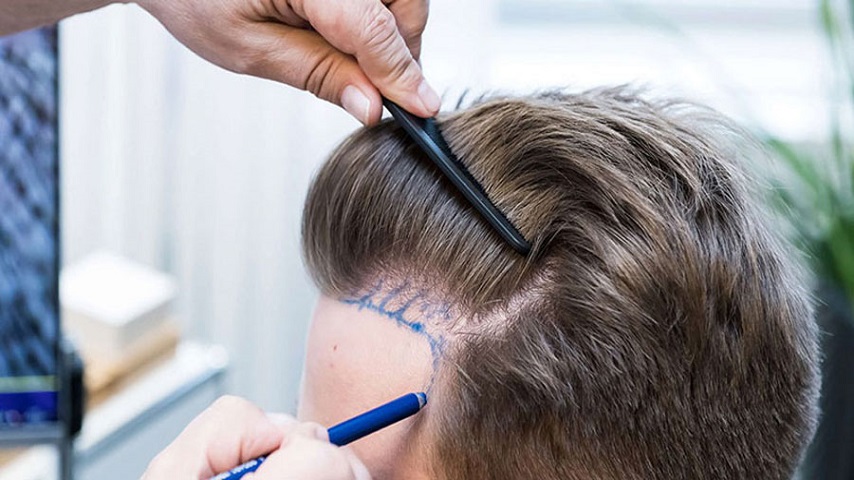Everyone dreams of having thick, luscious locks, but sometimes, no matter what you do, your hair just won’t seem to grow. This can be frustrating, especially if you’ve been trying to maintain a stylish haircut like a taper fade, which requires regular trims and healthy hair growth. If you’re struggling with hair that’s slow to grow or feels stuck at the same length, don’t worry. There are several factors that could be affecting your hair growth, and fortunately, there are also solutions.
Why Your Hair May Not Be Growing
Genetics
One of the biggest factors affecting hair growth is genetics. Just like your eye color or height, your hair’s growth rate and maximum length are influenced by the genes passed down from your family. If your parents or grandparents experienced slow hair growth, you may notice the same issue.
Hair Damage
Hair damage is another common reason for stunted growth. Excessive heat styling, chemical treatments, or rough handling can cause hair to become weak and break off before it gets the chance to grow longer. If your hair is brittle and prone to split ends, it will break more frequently, which can make it seem like it’s not growing at all.
Scalp Health
Your scalp is the foundation for healthy hair growth. If your scalp is dry, irritated, or clogged with product build-up, it can interfere with hair growth. Inflammation and scalp conditions such as dandruff can also hinder your hair’s ability to grow effectively.
Solutions to Boost Hair Growth
If you’re struggling with slow hair growth, there are a few lifestyle changes and treatments that may help speed up the process.
Maintain a Healthy Diet
Healthy hair starts from the inside. Make sure you’re eating a balanced diet rich in vitamins and minerals, especially those that support hair health like biotin, vitamin E, and omega-3 fatty acids. Foods like salmon, eggs, spinach, and nuts are all excellent choices to support healthy hair growth.
Protect Your Hair from Damage
To prevent breakage, minimize the use of heat tools like straighteners and curling irons. If you must use them, always apply a heat protectant spray beforehand. Similarly, avoid excessive brushing or tugging at wet hair, as it’s more prone to damage when it’s damp. Opt for wide-toothed combs and gentle handling to reduce the risk of breakage.
Regular trims can also help. It might sound counterintuitive, but trimming your hair every few months helps remove split ends and keeps your hair looking healthy. Even if you’re growing out a ninja low taper fade, regular trims can help maintain the shape of your cut and keep your hair healthy.
Use Scalp Treatments
Taking care of your scalp is just as important as caring for your hair. Consider incorporating a scalp massage into your routine, as this can stimulate blood flow and encourage hair growth. You can use natural oils like coconut or argan oil to moisturize your scalp and reduce dryness. There are also scalp scrubs available that can help remove product build-up and promote a healthy environment for hair growth.
Avoid Stress
Stress can take a significant toll on your hair. High levels of stress have been linked to hair loss, thinning, and slower growth. To support your hair health, find ways to manage stress through activities like yoga, meditation, or even just taking time to relax. A calm mind can have positive effects on your hair.
Consider Hair Growth Products
There are several hair growth products available that can help stimulate growth. Look for products that contain ingredients like minoxidil or biotin, which are known to support hair growth. However, be cautious of miracle products that promise instant results, as hair growth typically takes time and consistency.
When to See a Professional
If your hair still won’t grow despite trying various treatments, it may be time to consult a professional. A dermatologist or trichologist (a specialist in hair and scalp health) can examine your scalp and provide personalized advice. They may recommend medical treatments, such as laser therapy or prescription medications, to help with hair growth.
In some cases, underlying health issues such as hormonal imbalances or nutrient deficiencies can affect hair growth. A medical professional can help diagnose these issues and guide you toward the right treatment plan.
Conclusion
Struggling with slow hair growth can be frustrating, but there are plenty of steps you can take to encourage your hair to grow longer and healthier. From nourishing your body with the right nutrients to protecting your hair from damage, every little step helps. Whether you’re trying to grow out your taper fade or simply want healthier locks, patience and consistent care are key.
